#grand budapest hotel style
Text

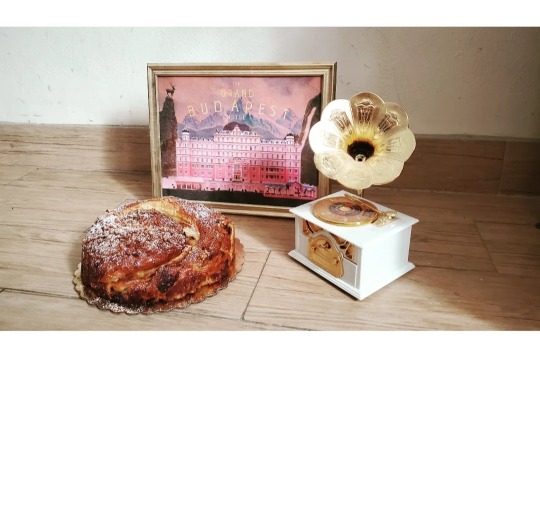
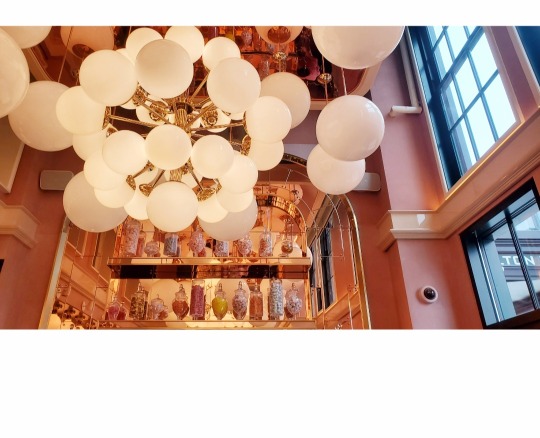
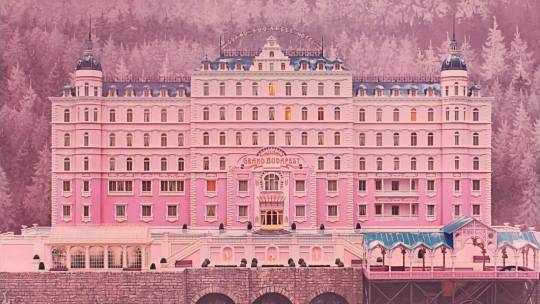
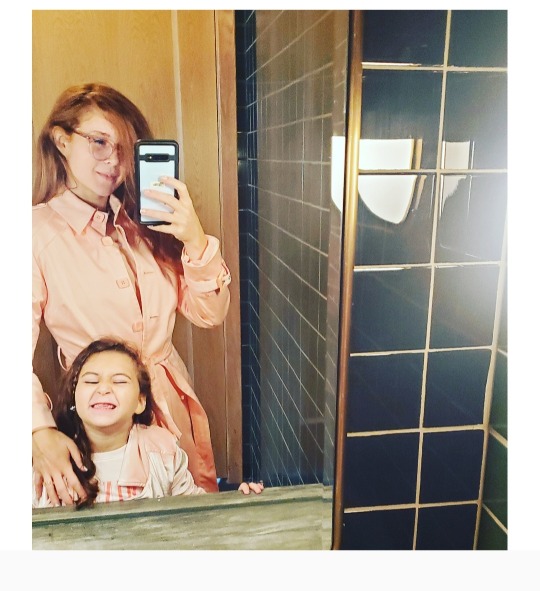
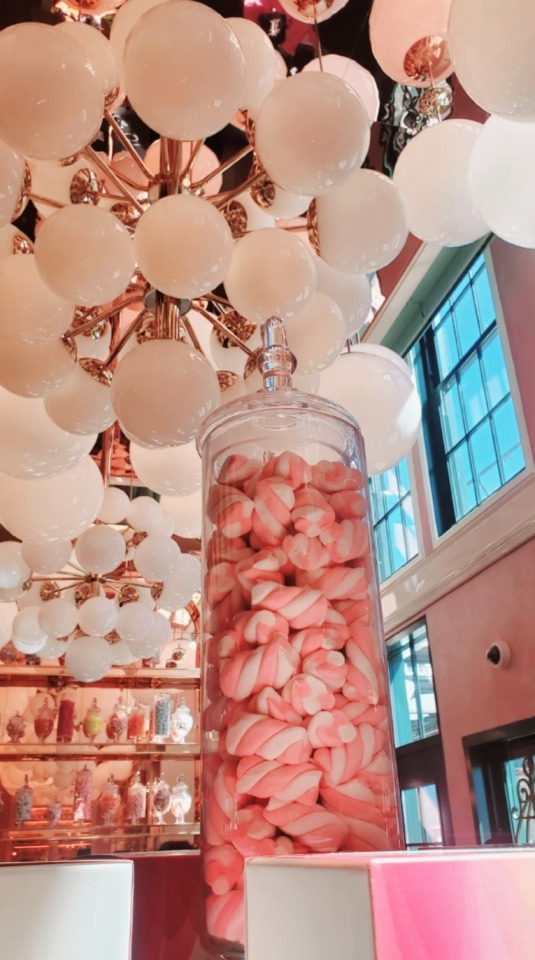
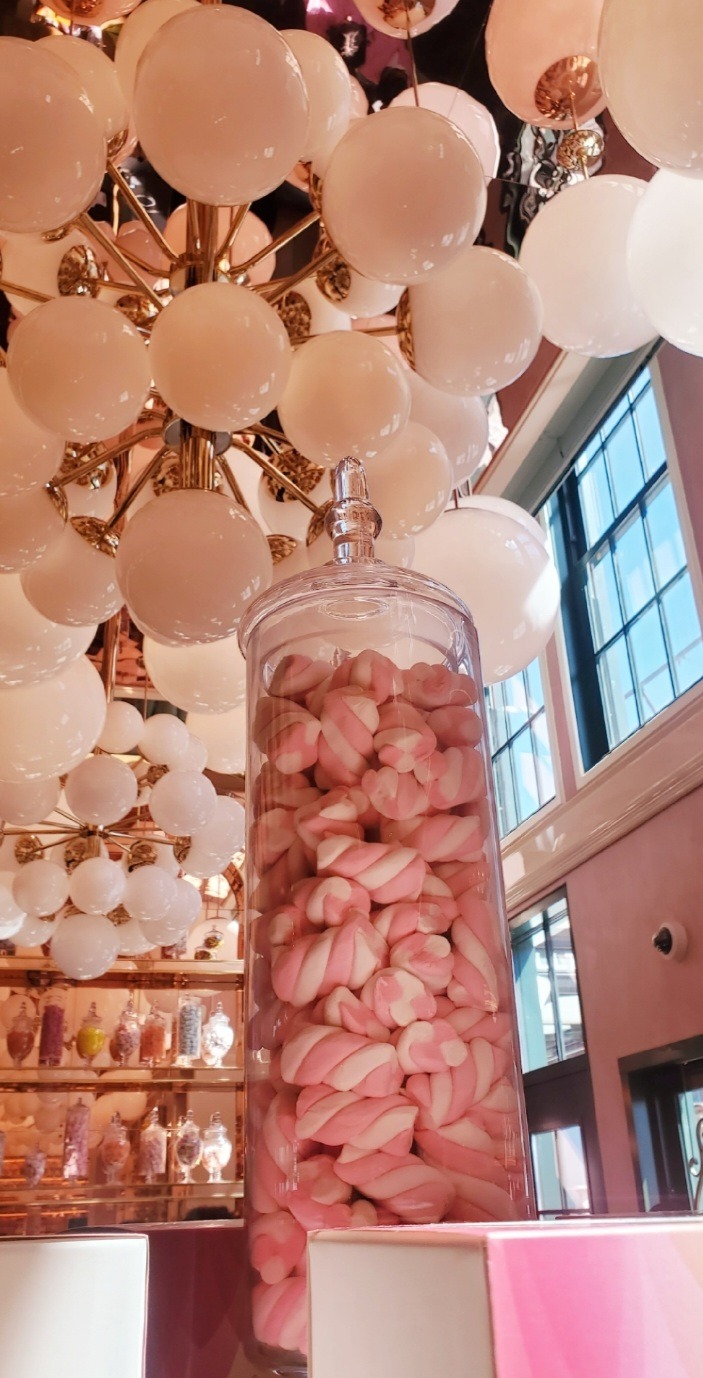
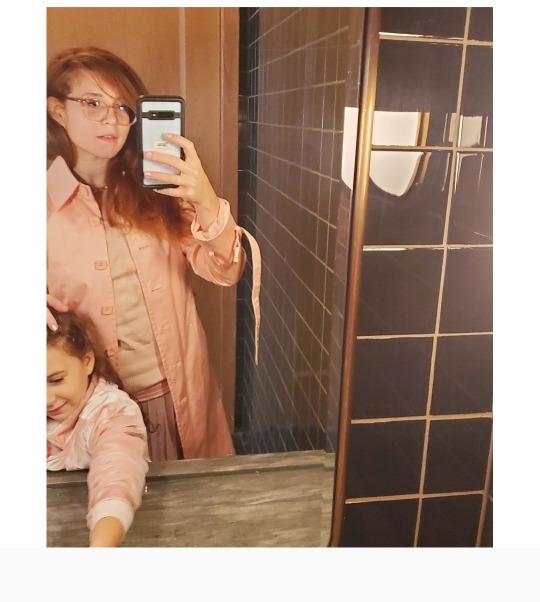
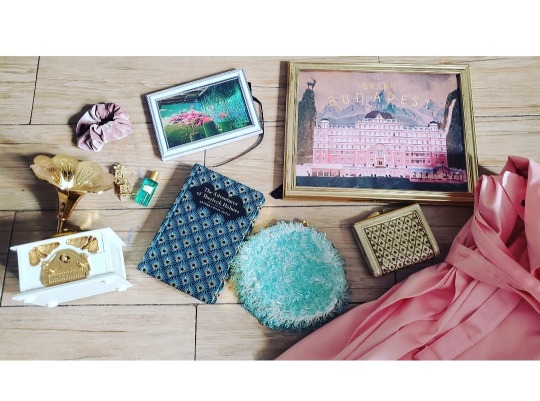
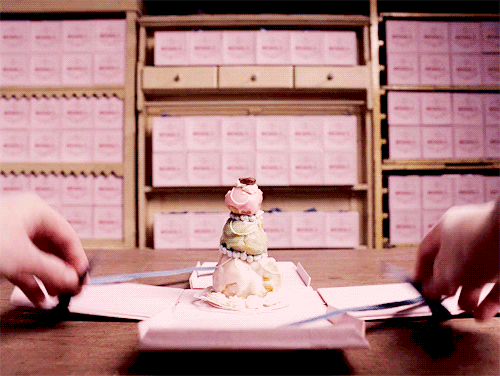
It's The begining of the New Year for Me and my daughter Lily🦄; there are new adventures to embark on and new reasons to smile and new winter adventures await!🐻❄️
Our style at this moment is inspired by the super vintage, candy-colored ode to winter The Grand Budapest Hotel.
For anyone who isn't familiar with the pink and peculiar film of Wes Anderson then I'll explain in a pastel pink Mendls bakery box tied with a ribbon. The quirky caper of comedic errors and stylish silliness takes place against a beautiful backdrop of a wintry hotel wonderful that's as visually stunning as it is incredibly vintage.
The vibes at the Jean Gorges Tin building at the soul street seaport have the same vibe. Walking distance from Michaeli's bakery ( the sweet apple raisin babka that almost tastes like rustic stollen pastry is incredible) and nestled amongst the most stylish ships is the most incredible ode to vintage visuals that I have ever seen in NYC. Maybe it's the glowing art deco globe lights that dot the golden ceilings almost like golden clusters of grapes or maybe it's the attention to detail that's so Impeccable there isn't a napkin holder that doesn't reference a richly vintage European era of cafe society...but this building is cinema at its best.
To chill in such a lush building one needs to wear something statement making. Lil and I chose candy pink. To match the vintage candy shoppe all pink and gold and white and magical. My pink vintage trench by French brand apostrophe is vintage and a gift from one of my best friends. My light pink sweater, also vintage, and glasses-warby Parker are also a reference to mid-century sophistication that is as polished as it is Parisian. My daughter Lil also wore all pink and to usher in a sweet new year we had candy and coffee and marveled in the magic of the place.
We definitely recommend visiting the south st seaport and if your feeling really grand wear a conversation piece something vintage something and something unexpected.
64 notes
·
View notes
Text
Wednesday, October 4th.
The Wonderful Story of Henry Sugar.
"Good evening, Mr. Sugar," said, well, said this post. Whose job it was to never forget a face. Not least your most lovely visage.
You must forgive us. We find ourselves in something of a straight-faced frenzy for all things whimsical, symmetrical, deadpan, and meticulously crafted—like, by way of example, Wes Anderson's take on the lesser-known Roald Dahl short story: The Wonderful Story of Henry Sugar. It features a pleasing color palette, an ensemble cast, a parable of spiritual growth, this idiosyncratic director's visual inventiveness, distinctive style (such style), and Benedict Cumberbatch with a delightful mustache. At this point, we would say something like what's not to like? or need we say more? But why would we say this. There is nothing not to like here. There is nothing else that needs to be said. It's Benedict Cumberbatch—with a mustache.
We relent. If you really remain unconvinced, we will make the case by sewing together all of the above (the palette, the style ((such style)), Cumberbatch, etc.) and present what we consider one of the finest shots ever put to film. Exhibit A.

If that doesn't persuade you, perhaps we can sweeten the deal with this: The Benedict Cumberbatch Name Generator.
#today on tumblr#wes anderson#henry sugar#the wonderful story of henry sugar#benedict cumberbatch#wes anderson movies#ben kingsley#wes anderson films#ralph fiennes#wes anderson fanart#wes anderson style#roald dahl#the grand budapest hotel#wes#wesblr#film#filmblr#film aesthetic#dev patel#richard ayoade#poison#the swan#the rat catcher
416 notes
·
View notes
Text

The Grand Budapest Hotel (2014) written, directed and co-produced by Wes Anderson
10 notes
·
View notes
Text
I just love when media is created as a love letter to a person, art or something else entirely. Media created by passion. Need more of it
#like you can just tell when the writer is passionate about what they are writing about#and i am eating it up every time#like#the grand budapest hotel#is very obviously a love letter to stefan zweig's work#and it is visible through the screen#more similar to his style than adaptations of his work even#even the teen beach movies#though they hold a special ridiculousness#are very visibly made by a person who loves musicals#so much that they reference old musicals in style and tone#there are grease as well as west side story references in the first movie#also a singin in the rain reference in movie 2#and i love to see it#teen beach movie#teen beach 2#movies#cinema#media analysis
49 notes
·
View notes
Text
Wes anderson movies really itch the brain correctly
#like i know they itch wveryones brains but i feel like my autistic brain is especially itched yknow#like it’s just the order and precision and attention to detail#my ideal world to live in would be a wes anderson movie tbh#but yeah watched the wonderful story of henry sugar and the swan yesterday and honestly.#in a weird way i feel like his style is better suited to the shorter stuff#like in his other movies like the french dispatch and the grand budapest hotel and such#i would only be able to tell you a fraction of the plot#like ik the point of them isnt the plot so much but i do like being able to follow and remember it#but with wes anderson the style often overtakes it#it may also be roald dahl like in fantastic mr fox it was definitely easy to follow it might just bethat#but either way. i enjoyed.
2 notes
·
View notes
Text
casual MLA formatting (a common way of structuring essays and citing sources) and following established nonfiction/journalism writing rules are really cool in online spaces like tumblr. let me briefly give some examples.
if you’re using an acronym in your post, establish what the acronym means first, like “the grand budapest hotel (GBH)” THEN use the acronym for the rest of the post. i see too many posts that just go right into the acronyms with nothing else to indicate what they mean, like “if you like the HTTYD movies but you’ve never read the books, are you really a fan?” which makes no sense to someone who doesn’t know what HTTYD is. instead, say “if you like the How To Train Your Dragon (HTTYD) movies…” just to give people a chance. this goes for shorthand/abbreviations and slang terms, too!!
if you’re quoting or referencing something, CITE IT. “actually tempering chocolate with extra cocoa butter results in XYZ (source)” is so much more useful for people who want to learn more than a lone claim with no source or reference. even a link/url or saying “look up “specific phrase” to learn more” is more helpful than nothing. we live in a period where nearly everyone has access to the internet, but not everyone knows how to navigate it. if you already have a couple sources, make it easier for everyone by citing them. different citation styles have different rules, but i use MLA because i already have all the rules memorised.
beyond that, being conscious of paragraph breaks and individual sentences is extremely helpful. we fanfic writers and readers joke about a massive block of text being a turn off, but it is the same for nonfiction!! chunk out your rant into bite sized paragraphs please.
i know online spaces like tumblr can be extraordinarily casual with slang terms and grammar rules, but it often gets to a point where even posts intended to be educational and informational are incomprehensible. i don’t really care about your two thousand blorbo posts, but if you’ve ever wondered how to improve the coherency of your rants and tangents, start with improving grammar, establishing acronyms, shorthand terms, and slang terms, and citing any claims you make especially if you already have sources on hand.
this has been a Public Service Announcement (PSA).
466 notes
·
View notes
Note
What's your opinion on Wes Anderson's movies and how he uses orientialism?
there are people far more more knowledgeable on this topic than me (here and here are articles on this written by Asian critics) so take anything i say about it with a grain of salt! I do love Moonrise Kingdom, Fantastic Mr Fox and the Life Aquatic because they inspired me loads as a writer growing up. I think that Wes Anderson has somewhat acknowledged the influence of South Asian cinema on his work, like when he dedicated Darjeeling Limited to Bengali director Satyajit Ray, BUT it doesn't really excuse his orientalism, racism and appropriation of various Asian aesthetics in films like Isle of Dogs, grand Budapest hotel, and The Life of Henry Sugar. It's clear he views non white cultures as merely another ingredient he can add to his films to make them more quirky. I haven't seen all his films, but I was uncomfortable at the way he framed characters of colour in gbh and the french dispatch. There's rarely, if ever, any real thought to the roles he casts people of colour in and they're mostly treated as accessories to white characters. That being said, I still admire his craft and think his films are strongest when he remembers how his stylising enhances story, rather than aestheticising for its own sake. I've even written an article about how much I hate people bastardising his style on TikTok because it's such a vain treatment of his work. But ultimately I do take issue with the racism and orientalism in his filmography, and think he serves as a reminder that being influenced by filmmakers of colour isn't a get out of racism free card and I think his films are strongest when they're just about sad sily white people.
30 notes
·
View notes
Text
thank you so so much @morgana-lefay for tagging me!!! <333
Top 7 Comfort Films
I’ll modify it for myself!!
I don’t watch many movies, there’s no way I could name ones that categorize as “comfort ones” :// SO I’ll just name ones that I’ve seen and left me feeling positive emotions / just really liked them :)
1. dracula (1992)
watched it very recently and fell in love. the opening scene imprinted itself permanently in my brain. and oh god gary oldman in this <33
2. inception (2010)
haven’t seen it in ages but it was literally my favorite movie as a kid. I watched it over and over and over again, brings good memories!
3. all of us strangers (2023)
seen it this last friday. I know it’s not going to be everyone’s cup of tea but god so I recommend seeing it. extremely beautiful visually, amazing soundtrack. felt every possible emotion while watching, might have cried also 👍🏻
4. grand budapest hotel (2014)
love wes andersons style, love the characters, nice light watch. also brings lots of nostalgia
5. “slovo” house (2017)
this movie can’t get out of my mind. incredible imagery. I absolutely love the acting in this. VERY heartbreaking at times. sadly, I can’t find any place where I could watch it again :( I saw it in a cinema two years ago, it was some sort of a special event screening ://
6. a beautiful mind (2001)
not much to say here, just a great movie and I watched it with someone in some very nice circumstances 👍🏻
7. guys I literally don’t remember what movies I’ve watched throughout my life ☠️ so I’m cheating and mentioning a tv series
świat według kiepskich (1999-2022) ☠️☠️
absolutely iconic polish satire tv series, there are like 13 seasons and I’ve been watching it with my flatmate starting from season one up 😩 no plot just absurdity, kiepski enjoyer 4 life⁉️
no pressure tags, don’t feel obligated!!! @visible-disappointment @franwikema @flakey-von-wembstein @rammingthestein @vulnerant-omnes @maliciousdelice @namelessrammgirl @buuucky-barnes
8 notes
·
View notes
Text
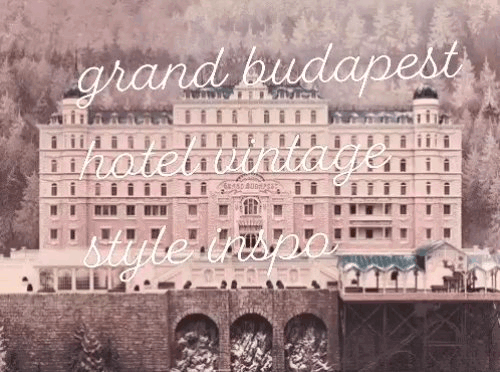


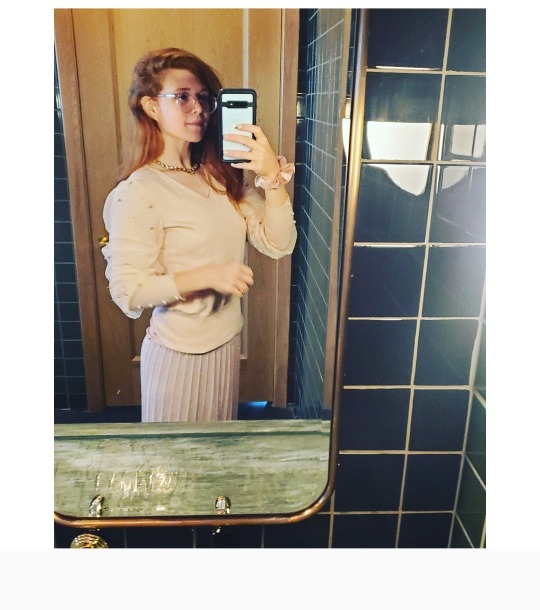


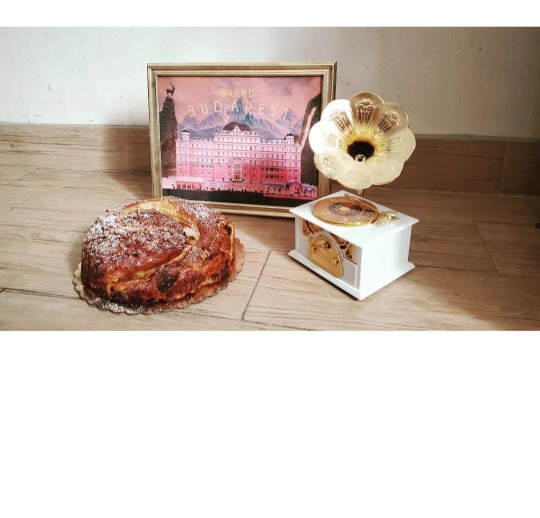

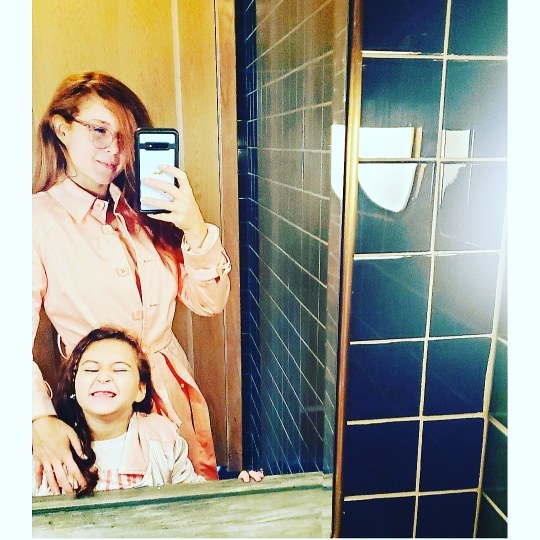

It's The begining of the New Year for Me and my daughter Lily🦄; there are new adventures to embark on and new reasons to smile and new winter adventures await!🐻❄️
We wore all pastel vintage to the Jean George's building in the South Street Seaport and we ushered in a sweet new year from candy from the pink and pretty candy shop inside that's reminiscent of a very Wes Anderson style scene, think Mendls in The Grand Budapest Hotel....
My trench is vintage, my sweater is vintage my glasses are Warby Parker and my daughter Lily wore H&M
We love vintage style and well be posting alot of classic cinema inspired looks in future posts all in our favorite nyc spots!
103 notes
·
View notes
Note
Who is your biggest Wes Anderson pookie? Like which character do you love the most
I have a utterly hard time choosing on such matters but I am afraid to mention that Zero and Agatha may be entitled to owning my heart. I am utterly smitten by their tale.

However I do have to admit to Dmitri being a close shot aswell, as a simp of Adrien brody and frankly finding this character utterly hilarious (and he does remind me of my friend) but Henckels too, I love characters trying their best xD.

M. Gustave takes number one in style and all, I do frankly find tons of enjoyment within this iconic character aswell. I do wish my hair looked as winsome as his.
But the sisters entice too and so do the criminals and I do find it hard to choose. However I do think that factly my favorite character of Wes is found in the Grand Budapest Hotel however there I am unable to settle for one of these wonderful folk.
7 notes
·
View notes
Text
The Wonderful Story of Henry Sugar (2023) Review
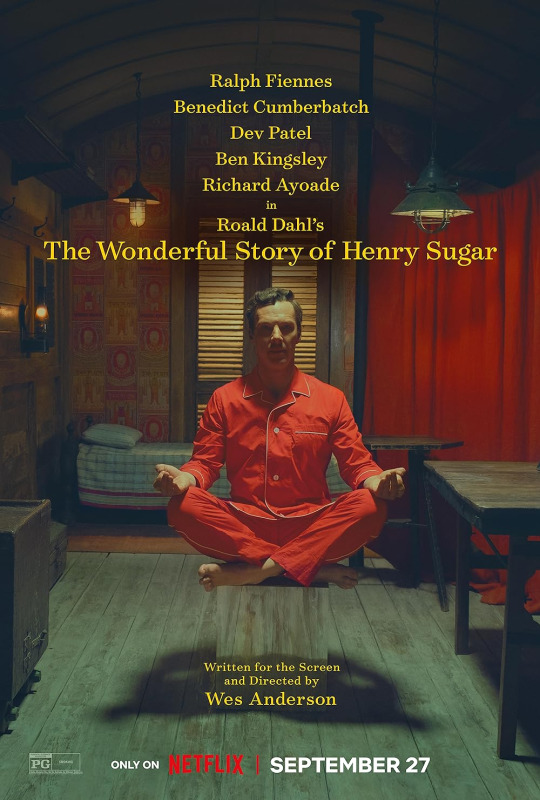
As the new dawn broke, my eyes fell upon the streaming interface of my Netflix account, and at that moment it was that I noticed it. "What's this?" I cried. "Another Wes Anderson film already?" I drank my cup of water to catch my breath. "But it's only been a month or two since his last one!" I thought. I stood up and slowly applauded Mr Anderson for his dedication to his busy schedule. "Right then, let's get to it." And with that, I sat back down and happily sighed in preparation for the unorthodox piece of storytelling whimsy that awaited me in the next 38 minutes.
Plot: Henry Sugar, a wealthy man, decides to take on an extraordinary challenge - he wants to master an extraordinary skill in order to cheat at gambling games.
I'm in the minority when it comes to my opinion of Wes Anderson's most recent film release - Asteroid City. Even though I enjoy Anderson's uniquely symmetrical and colorfully vibrant directing style, I did find that movie came off a bit too obnoxious and pretentious for my liking. That has not swayed me away from the talented director though, as The Grand Budapest Hotel is still one of my favourite indies to come out this century (if you're a collector such as myself seek out the superb Criterion release of this) and by the way managed to make the colour pink look cool before the Barbie blockbuster came about, and Moonrise Kingdom is an innocent coming-of-age comedy that used humour to deliver its internal message about 'the end of childhood', but presented not as a loss, but more-so a compromise. Wes Anderson is a tour-de-force with his own distinct vision, so individuals such as him should be cherished in modern-day cinema that is saturated with unoriginal mediocrity. So for Asteroid City, I forgive you, kind sir.
With The Wonderful Story of Henry Sugar Wes Anderson returns to adapting Roald Dahl's works, and seeing as how in the past he so fantastically brought to life in stop-motion Fantastic Mr. Fox, it seemed like the return is a welcome one. And indeed Henry Sugar is a most delightful little Netflix short film, that very much reinstates the fact that Anderson and Dahl are a match made in heaven. This starts right with the title, as with The Wonderful Story of Henry Sugar Anderson sets out to tell a story literally. In the film, all the characters also narrate everything they do and say, as such at times you feel like you're listening to an audiobook. You can literally watch this movie with your eyes closed and you'd still know exactly what happens. Ironically, seeing with your eyes closed is a primary theme of this short. But also you would be doing yourself a disservice keeping your eyes shut. The production design is impeccable with the entire thing feeling almost like a live theatre performance. With the set design and scene transitions, Henry Sugar exudes a distinct theatrical vibe, adding a layer of whimsical charm. And the moving sets are wonderful to look at, with the colors and detail nothing short of superb. The entire thing is simply overflowing with creative charm.
This is Benedict Cumberbatch's first entry into the Wes Anderson verse, yet it is shocking that it took this long to happen, as the Sherlock alumni is known for his fast-talking swift line delivery, and with the amount of dialogue Anderson always gets his actors to churn out in every scene naturally makes Cumberbatch appear right at home. Even at this short's rapid 38-minute runtime, Cumberbatch manages to add layers of depth to the peculiar Henry Sugar, from the small facial expressions as his character processes certain revelations. The rest of the ensemble does their part to add to the whimsy of the whole piece, with Dev Patel shining especially with his delivery of the fourth-wall-breaking narration, fast-talking his lines of dialogue with brisk elegance, and in the same breath managing to throw in the "I said" and the "he cried out loud".
All in all A Wonderful Story is a mesmerizing dance of wit, wonder, and whimsy that is aesthetically pleasing, and the story itself is an enjoyable little bedtime tale that, though not particularly deep. Look, cynically speaking it's a story about a man who reads a book and then learns a technique that allows him to easily make money. That's about it, however, it's the overall presentation and Anderson' touch that makes this the delightful piece of tapestry that it is. If you're a Dahl and Anderson enthusiast, I mean, there's really no excuse then for you to miss this.
Overall score: 7/10
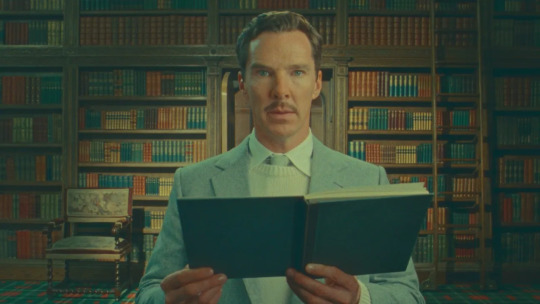
#wes anderson#roald dahl#the wonderful story of henry sugar#netflix#short film#comedy#adventure#drama#theatrical#benedict cumberbatch#dev patel#ben kingsley#ralph fiennes#richard ayoade#henry sugar#the wonderful story of henry sugar review#2023#2023 in film#2023 films#streaming#the man who sees without using his eyes#movie#film#movie reviews#film reviews
13 notes
·
View notes
Text
With the Spielberg/Jackson sequel becoming less and less likely to ever happen, here's a look at another Tintin movie we could one day have if Moulinsart stops being such a little bitch
English translation under the cut:
The Castafiore Emerald: Patrice Leconte dreams of a "slightly artsy" film in the style of Wes Anderson
In 2020, we learned that the director of Les Bronzés wanted to adapt Tintin to the cinema. More precisely: The Castafiore Emerald. Patrice Leconte swore he had already chosen the interpreters of the singer and Captain Haddock, but very quickly, the question of adaptation rights posed a problem, and the filmmaker finally directed Maigret with Gérard Depardieu.
Just as he releases a book devoted to the Belgian investigator published by Moulinsart Casterman, entitled Tintin de A à Z [Tintin from A to Z] (which takes elements from the famous cover of Emerald as can be seen above), he gives an update on this film, which he still intends to shoot.
"The Castafiore Emerald film project is not completely down the drain, but it's so complicated, what with the rights issues with Paramount and Moulinsart," deplores the filmmaker, relayed by BFMTV [a French national television channel]. "Maybe to calm my impatience, Moulinsart offered me this Tintin primer. They gave me carte blanche."
He then justifies his choice of the only Hergé comic strip taking place entirely at Marlinspike Hall ("I dream of making an adventure film without adventure") and specifies that he already has "the whole film in mind". Quoting the works of Wes Anderson (whose universe sometimes openly refers to the work of Hergé, notably in The Grand Budapest Hotel, where some shots seemed to be taken from his comics), Leconte speaks of a "slightly artsy film": "I will not take the album in my left hand and the camera in my right hand, but I will try to respect everything that the album visually communicates: the fabrics of the Castafiore's outfits, the step that is missing a chunk of marble... I really believe that we can make a film in a ligne claire style [...] We can allow ourselves liberties if they are in the spirit of comics, but otherwise it will be extremely faithful. I want it to be very close in terms of frames, colours, flat tints, absence of shadow."
On the casting side, if he had mentioned actors in 2020 (without quoting them), he no longer talks about them here, simply explaining that he will undoubtedly bet on an unknown actor for the title role: "What will amuse me when I shoot, it's to only have known actors for lines like ‘Hello, is this Mr. Cutts, the butcher?' and that the only unknown actor is Tintin. But I don’t see any known twenty-year-old actors who look like Tintin. I prefer to do a complete casting to find a Tintin." As for Snowy, he assured three years ago: "We will take any pooch, that won’t be a problem."
While he has "the whole film in mind", Patrice Leconte has not yet written his screenplay. He specifies that he wants to team up again with his accomplice Jérôme Tonnerre (Mon meilleur ami, Confidences trop intimes, etc.), but adds in the process: "We are not going to spend three months of our life writing a screenplay if the film never ends up being made. I don't want to get too involved. You can't live too long with fierce hope, because afterwards you can only be disappointed." Finding the process of adapting Tintin "too long", he concludes by saying that he won't do it after his 77th birthday (to respect the saying that Tintin is aimed at readers aged 7 to 77?): "I said that I only had a year and a half left to make the film, because I'm going to be 77, the age limit for enjoying Tintin. It was an irrefutable argument, but it didn't bother them too much."
Finally, evoking all of Hergé's comics in Tintin de A à Z, he proclaims his admiration for the adaptation directed by Steven Spielberg in 2011, The Adventures of Tintin: The Secret of the Unicorn: "It's the best adaptation of Tintin. Pure Hergé and pure Spielberg. He understood everything. He managed to translate without betraying. I really enjoyed it."
#tbh not sure if this would work#i've said it before and i'll say it again: castafiore emerald works best as a sitcom-type comedy#otherwise people who aren't familiar with tintin won't enjoy it (and might even end up hating it)#but hey any adaptation is better than no adaptation so fingers crossed moulinsart gets their shit together and green-lights this#tintin#the adventures of tintin#the castafiore emerald#french#translation
23 notes
·
View notes
Text
Film #911: 'The Grand Budapest Hotel', dir. Wes Anderson, 2014.
Wes Anderson is a director that, if you listen to the general tone of pop culture criticism, has rapidly descended into a parody of his own style. The hallmarks are instantly recognisable: symmetrical shot compositions; pastel colours; Bill Murray; endless lists of items; unusual heroes; Owen Wilson. It's even reached the point that a travel site, Accidentally Wes Anderson, collates lists of locations by colour, retroactively applying the director's name to them as though this idiosyncratic style somehow predates the architecture itself. His is a style that is easily parroted and frequently sneered at as being too artificial. How do you make a film that speaks to real life, if reality isn't allowed anywhere near your films?
Until I really paid attention to The Grand Budapest Hotel, I felt similarly. This film has a seventeen-person ensemble cast, with characters completely disappearing from the narrative after a few scenes, and this approach always runs the risk of feeling gimmicky. Wes Anderson's works are often reduced to silliness, and can feel like they have replaced narrative purpose with zany setpieces that don't contribute to anything. And then something caught my eye: 'Inspired by the works of Stefan Zweig'.
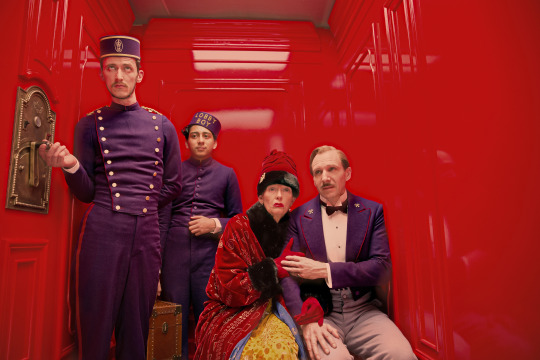
The Grand Budapest Hotel starts with a framing device inside a framing device: a girl goes to a cemetery (labelled in block letters on the exterior wall - a motif that will get used a lot in this film) to pay her respects to a writer. The writer (Tom Wilkinson and Jude Law) has written a book called 'The Grand Budapest Hotel', in which he recounts going to the hotel of the same name and having dinner with the hotel's owner, now faded into obscurity. The owner, Zero (F. Murray Abraham and Tony Revolori) started work as a bellhop, and he tells the author of the hotel's former concierge and their escapades together in the time immediately before a 1930s fascist regime took hold. The concierge, Gustave (Ralph Fiennes), is notorious for starting affairs with rich dowagers, including the secret owner of the hotel. When the dowager dies abruptly, Gutave and Zero, his new hire, go to pay their respects and are quickly embroiled in the arguments surrounding the deceased's estate. Gustave is surprised to learn that he has been bequeathed a famous Renaissance painting, 'Boy with Apple', but the dowager's heir, Dmitri (Adrien Brody), refuses to let this happen. Undeterred, Gustave and Zero steal the painting. Shortly afterward, Gustave is arrested on suspicion of murdering his benefactor, following the testimony of the woman's butler.
Zero takes over many of Gustave's duties, while scheming with his girlfriend Agatha (Saoirse Ronan) to break the concierge out of prison. They do this by hiding tools in the pastries that Agatha makes during her work at a bakery. Despite the pastries being suspiciously tool-shaped, their decoration makes them too valuable to inspect for contraband. The scheme works and Zero and Gustave are reunited. Gustave calls upon the assistance of a secret society of hotel concierges to facilitate a meeting with Serge, the dowager's butler and the person whose testimony was responsible for Gustave's arrest. Serge confesses that he was pressured to implicate Gustave by Dmitri, the real killer, and that the dowager has a second will which is to come into effect if she happened to be murdered. Serge is killed by Dmitri's hitman, Jopling (Willem Dafoe). Zero and Gustave flee back to the hotel, only to find it converted into a headquarters for the fascist regime. Nonetheless, they are able to retrieve the painting, which has the second will hidden behind the canvas where Serge placed it for safe keeping. The second will grants the hotel to Gustave, and Dmitri flees the country.
Overall, the story is quite complex and swift-moving, and some of the connections between events seem arbitrary. For instance, the audience is shown that the will is concealed in the painting right after the painting is introduced, when Serge packages it for Gustave and Zero to take. However, neither Zero nor Gustave know this, and it is Agatha who discovers the will. This means that Zero and Gustave take several actions which directly lead to the discovery of the will without having that as their specific intention. After the murder of Serge, the protagonists pursue Jopling on a sled, resulting in a surreal chase scene - mostly conducted through stop-motion - at the end of which the characters launch from a ski jump. Throughout this film, it often feels like the characters are just doing things that just happen to be the things required to move the plot forward. This tendency is what makes Anderson's films feel artificial and immature: they're not closely-knitted narrative structures but rather the net results of a random assemblage of characters and events. And yet, this film was purportedly inspired by one of Austria's most famous novelists, famed for his simple storytelling. What gives?
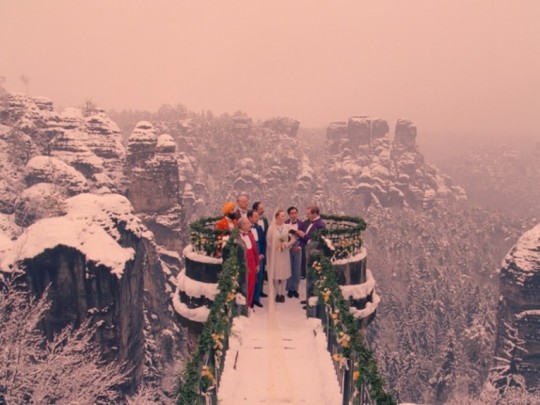
Stefan Zweig's novels - especially Beware of Pity (1939) and The Post Office Girl (1982), which Anderson has explicitly said he borrowed from for this film - are deeply fatalistic, which does seem to mirror Anderson's perspective on the setting of The Grand Budapest Hotel. Zweig was writing during the advent of the Second World War, a period mimicked by the film's establishment of an unnamed fascist regime. In The Post Office Girl, his protagonist feels an intense nostalgia for her stay at a hotel, and the theme of nostalgia is common to many of Zwieg's novels, and Anderson's films as well (Moonrise Kingdom (2102) is perhaps the most evocative of his musings on nostalgia). Perhaps the most relevant stylistic similarity between the two is their fixation on surface details, and how these act as indicators of character. Writing in the Paris Review, for example, Kevin Nguyen observes that we understand Anderson's characters through the details of their appearance and locations. He cites a passage from one of Zweig's novellas that similarly catalogues every item of clothing a character is wearing, and points out that each of these descriptions is "larded with an assessment of his character." The description of the hotel in The Post Office Girl is similarly detailed, and we learn most of what we do about the title character from how she thinks about these items.
The nostalgia, too, is the sort of thing that Anderson could have borrowed directly from Zweig's novels if he had discovered the author earlier in his career - again, it's a situation where we have to be careful about implying a direct inspiration, as the nostalgia in Anderson's works definitely predates his stated interest in Zweig's work. In this film, Anderson refers explicitly to the idea that the nostalgia that Gustave felt for the hotel, and that Zero has felt ever since, might have been a longing for a time that neither of them actually experienced - that the idyllic past never existed, and the hotel itself is an attempt to artificially invent such a time. Zweig felt this dislocation sharply: Richard Brody in The New Yorker discusses a passage from Zweig's memoir where Zweig is confronted with the differences in mood between the front lines of the Second World War and the civilian life of, coincidentally, Budapest. Perhaps, Zweig considers, the happy life of Budapest is not the way things usually are, with the war being an aberration in the normal state of affairs. Perhaps the keen edge of the happiness was a result of the war, a last grab at pleasure. This resonates with the Hotel Budapest: while the memories of the place are perfectly coloured, by the 1970s the decor has been replaced with drab orange walls and mildewy grout. Was it ever really this way?

Zweig also used framing narratives, and this structure is what helped me meet Wes Anderson's films on their own terms. The story-within-a-story structure has clearly helped Anderson make sense of his own films - after this, he used it again in his two most recent films, The French Dispatch (2021) and Asteroid City (2023). I think this might be the film in which he first fully embraced it. The artificiality of his earlier films is easier to comprehend and to stomach when we think of it as a representation of something in a book, rather than a depiction of real lived experience. In The Grand Budapest Hotel, the characters are unusual in the sense that they are fully-known by the audience. With a story as complicated and disparate as this one, the only way in which we can follow what's going on is by the characters repeatedly directly expressing how they feel and what they think. This is internal monologue, made external through lists of objects and through weirdly open dialogue. And if artificiality is required to make this world comprehensible, why not lean into it? Thus, the characters don't speak the way normal human beings do; they speak in a sort of polished third draft of human speech. They constantly sound as though they're quoting from another work. Likewise, why not reduce the sets and cinematography only to those details that help us understand the world - only just obtrusive enough for us to register that this is not meant to be a depiction of the real world?
I keep thinking of the chase scene on the sled, and thinking of how Anderson does something even more bewildering with a similar chase scene in The French Dispatch. The scenes are heightened and artificial; they beggar belief at the types of chaos that unfolds. But then I wonder what is happening in the 'book' that we are reading. Early on in the film, the camera movement and acting feels directed by a narration that, for once, we're not explicitly hearing - something like 'Gustave heard a knock at the door, and moved smartly towards it'. But what would this chase scene be written as, in the retelling of it by Zero, in the novel by the Author? Probably something as simple as 'A chase happens'. So why not have fun with it?
11 notes
·
View notes
Text

Rating: 4.5/5
Book Blurb:
In each of his films, Wes Anderson builds entire worlds that fans tend to feel somehow really should exist. Discover the rich veins of inspiration that he weaves into this unique magic.
Anderson’s colorful and richly structured style is universally admired – but how has he managed to create such an enigmatic visual signature?
Like many key creatives, he’s found inspiration in a huge host of varied influences. From Hitchcock and Spielberg, to Truffaut and Varda, there are countless filmic homages and references scattered throughout Anderson’s filmography, while his cultural anchor points also go deep beyond film, and into the worlds of art and literature. Evocations of place and time also underpin his work, from mid-century Paris in The French Dispatch, to grand pre-war Europe in The Grand Budapest Hotel, while cultural institutions – such as Jacques Cousteau and The New Yorker magazine – are other touchstones.
For Wes Anderson fans and cinephiles alike, uncover the fascinating creative process of one of the world’s most revered filmmakers.
Review:
A delightful book that gives you a inside look into the wonderful world of Wes Anderson. This is the perfect book for fans of Wes Anderson films and the whimsical worlds that he creates. It's such a fun creative read that really discusses his ideas and references throughout his films. I am a huge Wes Anderson fan and this was the perfect read for me.
Release Date: October 8,2024
Publication/Blog: Ash and Books (ash-and-books.tumblr.com)
*Thanks Netgalley and Quarto Publishing Group – White Lion | Frances Lincoln for sending me an arc in exchange for an honest review*
2 notes
·
View notes
Note
omg that halloween video was filmed over a (1!) year?! you already put so much work into making high quality videos, but that's some serious dedication! insane! rapid weight gain isn't usually what I go for but holy fuck the quality! do you have any video style inspirations? the lighting is just incredible, so moody/cozy, how long did it take to actually get the shots and then to edit? (the price for your patreon is an insane bargain either way) keep it up, dude!
Can I just say I really like that I get horny asks and art-influence asks? 🤣 Thank you for the questions! My style inspiration comes from cinema - no specific cinematographers that I can single out but the visual style I like is that soft indie film, sense of place type look. Films that have a strong, sometimes overwhelming, colour palette like Drive, La La Land, Enemy, Grand Budapest Hotel, The Fall, they really influence me. Films that use a really strong sense of colour and light to create a feeling. I really like cinema that looks like photography. Gregory Crewdson is one of my favourite photographers, his work is highly cinematic, he creates scenes that make you ask questions and I really like that cyclical influence of cinema on photography and vice versa which is really evident in his work. Annie Leibovitz is another huge fave. And look, let’s be real. I’m not thinking about these giants of the art world when I’m sitting down to plan my kinky little videos. But those are some of the influences that have gone into developing my style over the years.
And as for how long it takes, it varies a lot. Obviously the Halloween video took the longest, I don’t think I’ll ever top one year! 😆 But even the shots themselves took quite a while for that one, for a bunch of reasons. I was using my whole apartment so I was moving the lights and the set up a lot. I was trying to find angles where I looked skinny enough for the ‘before’ shots (not so easy anymore!!) and that took ages. There was make up I had to do for the stretch marks and padding for the end shots. In some shots I was so bloated I could hardly think straight and had to move carefully. There were also a lot of moving parts. I remember doing one shot where it was a slow pull back from the table overhead with the candles burning, water vapour for atmosphere, and as it was pulling back my phone had to come into shot and ring right as it became visible which I needed to trigger while I was doing the shot and keeping it steady… it was very complicated! 😆 So the Halloween video was multiple full days of shooting over the course of a year. But then something like my Fourth of July video was much quicker and easier to do. I just put on a tight flannel and went to town on a pie while moving the camera a few times for some variety in shots.
Editing used to take me much longer but I’m getting better at it now and I can usually get a whole video edited in half a day. Honestly the main thing I’m worried about is that as I’m getting bigger the filming is getting a little harder to do, especially the constant up and down of setting up the shot, getting in frame, checking the shot, etc. But I’ll just have to find a way to make it work because im having way too much fun. Thanks for your questions!
34 notes
·
View notes
Text
i wanna do some studies from the grand budapest hotel. i just watched it for the first time and i thought it was delightful... my favorite little detail was the way poetic dialogue would always be disrupted in some way. i think it was a thoughtful and funny way to underscore the theme of like. reality in tension with the romance of memory. also the way huge scenes looked like these little dioramas. like the scale of everything is so large, but when you take a step back everything is so compressed at the same time. it's the first movie i've ever seen by wes anderson, so i'm excited and hopeful to see more of his visual style.
4 notes
·
View notes